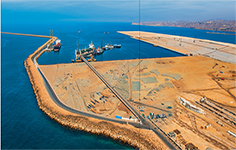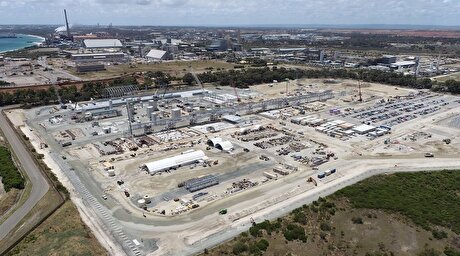
US Exempts Indian-Backed Chabahar Port From Sanctions

Iran late last year inaugurated the port on the Indian Ocean that provides a key supply route to landlocked Afghanistan and allows India to bypass its historical enemy Pakistan.
The United States will exempt from sanctions the development of Chabahar along with an attached railroad project and Iranian petroleum shipments into Afghanistan, the US State Department said, AFP reported.
US President Donald Trump's "South Asia strategy underscores our ongoing support of Afghanistan's economic growth and development, as well as our close partnership with India," a State Department spokesperson said.
"This exception relates to reconstruction assistance and economic development for Afghanistan. These activities are vital for the ongoing support of Afghanistan's growth and humanitarian relief."
The United States, which has been building closer relations with New Delhi since the late 1990s, earlier exempted India from sanctions that took effect on Monday.
Trump's decision has been opposed by European powers as well as other nations, including India, which has largely warm relations with Iran and accuses Pakistan of fomenting attacks on its soil.
India has poured $2 billion into Afghanistan since the 2001 US-led invasion of Afghanistan.
New Delhi has seen Chabahar as a key way both to send supplies to Afghanistan and to step up trade with Central Asia as well as Africa.
“We have shipped about 110,000 metric tons of wheat and 2,000 tons of pulses from India to Afghanistan through this port (Chabahar). We might also need to pursue the development of a rail line from Chabahar to Zahedan,” Indian Foreign Secretary Vijay Gokhale was recently quoted as saying.
Iran has plans to link the port by railroad to Zahedan on the Pakistani border up to Mashhad in the northeast.
On the back of a rail link that stretches to Iran’s northwestern border, Chabahar will facilitate the transport of goods from India to the landlocked countries of the Commonwealth of Independent States as well as Afghanistan.
India has agreed to build a 500-km railroad from Chabahar to Zahedan, the provincial capital of Sistan-Baluchestan, close to the Afghan border. India’s state-owned IRCON has agreed to build a rail route at a cost of $1.6 billion as part of the transit corridor to Afghanistan.
After connecting Chabahar to Zahedan, the railroad will be linked to Zaranj in Afghanistan. Hence, when the Afghan cargo arrives in Zahedan, it can be transported by a 1,380-km railroad to Chabahar and then shipped to India.
India's Interest in Chabahar
It was in 2003 that India first proposed developing Chabahar Port seen as a gateway for the country to access the landlocked markets of Afghanistan and Central Asia, as New Delhi’s tense ties with Pakistan blocked overland trade through Pakistan.
Chabahar is located less than 100 nautical miles from the Chinese built port of Gwadar in Pakistan.
In May 2016, India, Iran and Afghanistan inked a pact that entailed the establishment of a transit and transport corridor among the three countries using Chabahar Port as one of the regional hubs for sea transportation in Iran, besides multimodal transport of goods and passengers across the three nations.
The first phase of the strategic Iranian port developed in cooperation with India was inaugurated by Iran’s President Hassan Rouhani on Dec. 3.
Chabahar is Iran’s only oceanic port town and consists of two separate ports: Shahid Kalantari and Shahid Beheshti. The opening of the first phase of Shahid Beheshti Port (out of five phases defined for the project), which has tripled its capacity to 8.5 million tons (equal to that of all the northern ports of the country), will allow the docking of super-large container ships (between 100,000 DWT and 120,000 DWT) and increase India’s connectivity with Afghanistan.
Under the terms of the pact, India Ports Global Ltd, an Indian company, is to take over the interim operations of Chabahar Port and operate the terminal for 18 months.
In February, India and Iran signed a pact to lease to New Delhi the contract for the operation of Shahid Beheshti Port or Phase-I of Chabahar.
New Delhi is awaiting Iran's handover of Shahid Beheshti Port for operation by India.
Experts Welcome Exemption
"This was the right call. India's ability to not just continue its development assistance to Afghanistan but also to scale up, will be vastly enhanced by the development of the Chabahar Port," Alyssa Ayres, a senior fellow for India, Pakistan and South Asia at the Council on Foreign Relations think tank, was quoted by The Economic Times as saying.
Ayres, who had worked in the US State Department in the previous administration, said as Kabul and New Delhi seek ways to increase trade connectivity for Afghan exporters to the enormous Indian market, an overland and sea supply chain will be helpful as everything cannot be exported economically via air freight.
"Increasing opportunities for economic activity in Afghanistan will be crucial for the country's stability and India is the most important economy in the region to provide that to provide that ballast," she said.
According to Anish Goel, who was part of the White House's National Security Team during the previous US administration, the exception for Chabahar Port is a reflection of the "competing priorities at play".
"As much as the (US) administration wants to squeeze and isolate Iran, it also does not want to do anything to damage or restrict the ongoing efforts in Afghanistan. The port, when finished, will be vital for shipping goods to Afghanistan," he said.
"But it is clear that the exception was written to be as narrow as possible and focus only on those activities that will be beneficial to Afghanistan," Goel added.
The exemption provided to India is a much welcome and necessary step in the right direction, noted Bharath Gopalaswamy, director of the South Asian Center in the think tank, Atlantic Council.
"The exemption underscores that the US understands the opportunities that India offers by being an important partner and player in the region. This was the right step in the right direction," he said.
Senior officials of Afghanistan, India and Iran met in Tehran last month to discuss the development of Chabahar Port, which showed that India is committed to the project despite the threat of looming US sanctions on the West Asian country, Livemint reported.



Caterpillar sees US tariff hit of up to $1.5 billion this year

Australia pledges $87M to rescue Trafigura’s Nyrstar smelters in critical minerals push

SAIL Bhilai Steel relies on Danieli proprietary technology to expand plate mill portfolio to higher steel grades

Fortuna rises on improved resource estimate for Senegal gold project

Alba Discloses its Financial Results for the Second Quarter and H1 of 2025

Tianqi Lithium Australia JV says it is prioritizing long-term viability of refinery

Fresnillo lifts gold forecast on strong first-half surge

Copper price slips as unwinding of tariff trade boosts LME stockpiles

Why did copper escape US tariffs when aluminum did not?

Gold exploration spend trending down despite higher prices – S&P Global

A global market based on gold bars shudders on tariff threat

New research reveals source of world’s richest lithium deposits

Century Aluminum to invest $50M in Mt. Holly smelter restart in South Carolina

Australia to invest $33 million to boost Liontown’s Kathleen lithium operations

Glencore warns of cobalt surplus amid DRC export ban

SSR Mining soars on Q2 earnings beat

A Danieli greenfield project for competitive, quality rebar production

China limits supply of critical minerals to US defense sector: WSJ

Alba Hits 38 Million Safe Working Hours Without LTI

Gold exploration spend trending down despite higher prices – S&P Global

A global market based on gold bars shudders on tariff threat

Century Aluminum to invest $50M in Mt. Holly smelter restart in South Carolina

Australia to invest $33 million to boost Liontown’s Kathleen lithium operations

Glencore warns of cobalt surplus amid DRC export ban

SSR Mining soars on Q2 earnings beat

A Danieli greenfield project for competitive, quality rebar production

China limits supply of critical minerals to US defense sector: WSJ

Alba Hits 38 Million Safe Working Hours Without LTI














